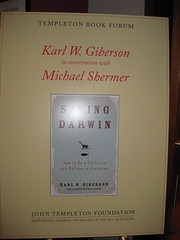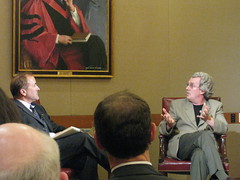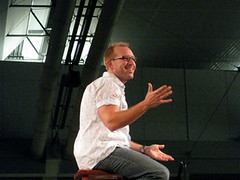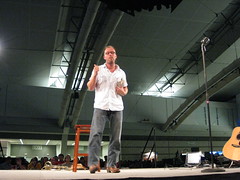Earlier today, Evan (author of “Why I’m Not Emergent”) tweeted “What do you find to be the best way to engage someone who speaks negatively about the emerging church and assumes you agree?” The last part of it is funny to me because it has happened a bunch of times but I want to discuss the first part.
Here’s what I found. Some people think the emergent church is:
- the work of the devil.
- equated with relativism.
- “liberalism repackaged”.
- a fancy way of saying that you’re “open minded” and welcome you to their world.
- dangerous or misplaced but still they are interested and curious and somewhat cautious about it.
To those that subscribe to the first 3, it depends how I am feeling that day. For me, I do not need to convert anyone to emergent-type thinking. I don’t think there is much to gain. When some say that they find it to be “unbiblical”, I’ll generally enter into conversation and ask: What have you heard, what have you read, why do you say this … I may or may not continue depending on that answer.
But let’s assume that you are in a great conversation with a wonderful Christ-follower. Their knowledge of emerging church is what they heard from someone who read DA Carson’s book three years ago, a critique or two from their Bible-believing pulpit, and the attacks on Brian McLaren and Tony Jones they Googled eight months ago. But they really are interested because they loved the title of Doug Pagit’s book A Christianity Worth Believing.
Generally, I begin by explaining that according to the EV website and the many lectures I’ve heard, that is usually described as a “friendship” or a “conversation”. Friendships don’t have doctrinal statements and healthy ones don’t have agendas. They can have passion, debate, even good German beer, but they also have love.
If we’re still friends, I offer to forward them Scot McKnight’s 5 Streams of the Emerging Church. In the good old days before 2008, I had recommended Generous Orthodoxy but now I recommend New Christians and if they’re rich (aka Presbyterian), then I tell them to buy both. (Still need to read A Christianity Worth Believing but like, everyone I love the title). After that, the most helpful book I read was Leslie Newbigin’s Proper Confidence. Thank you John Franke and yes, the second most helpful was the Character of Theology … after it was explained in class … by Jay, Evan, Jon, Wendy … Don’t mnd me, it’s a blog, I’m just having fun here.)
In the actual conversation I try to make these distinctions:
Postmodernism cannot be simply equated to relativism (although it contains it). Postmodernism is better understood as an age as opposed to merely a philosophy. Further, it is a response to modernism that seeks to combine the best of the pre-modern world (also known as the ancient world) and the modern world (as much good came out of it but it became incomplete when it lost its imagination and appreciation of mystery).
Regarding the “liberalism repackaged” line, among the many reasons (which some of them do not help) here is another. It’s been my experience that when a couple of “conservatives” discover that they are seated at a table with those they perceive to be “liberals”, their almost immediate response is to get up and leave the table. If their attempts at “real conversion” are unsuccessful, the eventual response is to abandon the conversation with the satisfaction of having known a seed of truth was planted in the jungle of “heresy” (which is a word that should be held with the same reverence as the F-bomb). I find myself not being socially liberal enough for some, and not conservative enough for others, but I’ve been very welcomed in this friendship.
That said, it’s ok to disagree in peace and love. One may have a hermeneutic they prefer or at a different part of the journey (or even on a completely different journey). The emergent thing does not really need an apologetic but it’s difficult for me to appreciate the “unbiblical” line. For me, I have a higher and I’d like to argue healthier view of the Bible. Thus, I do not appreciate the charge of being “unbiblical”.
For those of you further into the conversation, feel free to add/edit the list.
For those new, interested, curious, welcome, pull up a digital chair.
For those critical, have a nice day, Jesus loves me too (and so do we).




 Tony talked about his life starting in his senior year of
Tony talked about his life starting in his senior year of
 ere very helpful for me like many others.
ere very helpful for me like many others. 




Recent Comments